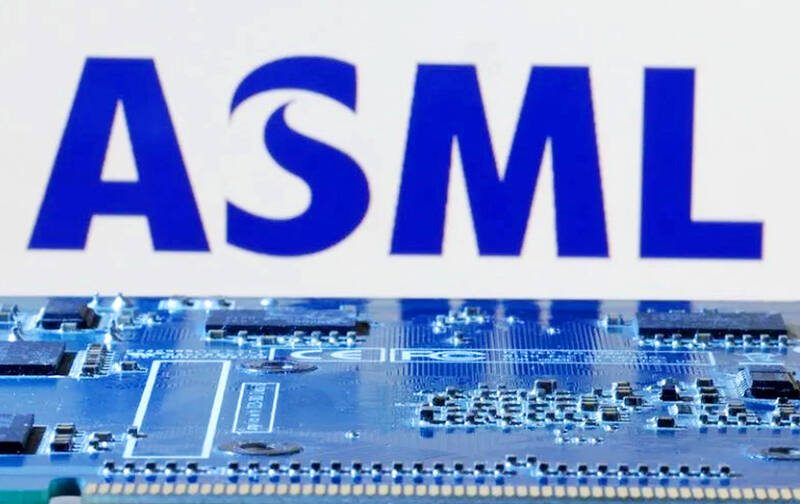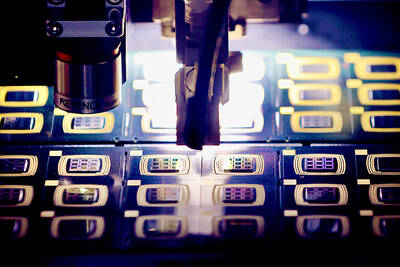ASML Holding NV will ship its latest chipmaking machine to Taiwan Semiconductor Manufacturing Co (TSMC, 台積電) this year.
Two of ASML’s biggest customers, TSMC and Intel Corp, will get the so-called high-NA extreme ultraviolet (EUV) machine by the end of this year, ASML chief financial officer Roger Dassen told analysts in a recent call, according to the company spokesperson.
Intel has already placed orders for the latest high-NA EUV machine and got the first one shipped to a factory in Oregon in December last year. It wasn’t clear when TSMC, the biggest EUV customer of ASML, would receive the equipment. A representative for the Taiwanese chipmaker said it works closely with its suppliers and declined to comment further.

Photo: REUTERS
ASML’s new machine can imprint semiconductors with lines that are just 8 nanometers thick — 1.7-times smaller than the previous generation — and will be used for producing chips that will power artificial intelligence applications and advanced consumer electronics.
The machines cost 350 million euros (US$380 million) apiece and weigh as much as two Airbus SE A320s. ASML is the world’s only manufacturer of the EUV lithography technology and demand for its product is a litmus test for the sector’s trajectory.
TSMC has raised concerns about the machine’s price tag. “I like the high-NA EUV’s capability, but I don’t like the sticker price,” TSMC Senior Vice President Kevin Zhang (張曉強) said in Amsterdam last month. TSMC’s so-called A16 node technology, which is due in late 2026, won’t need to use ASML’s high-NA EUV machines and can continue to rely on TSMC’s older EUV equipment, he said.
Still, TSMC has been an active participant in ASML’s high-NA EUV project. Jefferies analysts including Janardan Menon said they expect TSMC to use high-NA at the A14 node in 2028.
ASML remains of the view that revenue next year is likely to be in the upper half of the guidance range, the analysts said after the call with Dassen.
Jefferies analysts said it is likely that ASML’s average orders will be around 5.7 billion euros in the remaining three quarters of this year, pushing sales next year to 40 billion euros.

AI SERVER DEMAND: ‘Overall industry demand continues to outpace supply and we are expanding capacity to meet it,’ the company’s chief executive officer said Hon Hai Precision Industry Co (鴻海精密) yesterday reported that net profit last quarter rose 27 percent from the same quarter last year on the back of demand for cloud services and high-performance computing products. Net profit surged to NT$44.36 billion (US$1.48 billion) from NT$35.04 billion a year earlier. On a quarterly basis, net profit grew 5 percent from NT$42.1 billion. Earnings per share expanded to NT$3.19 from NT$2.53 a year earlier and NT$3.03 in the first quarter. However, a sharp appreciation of the New Taiwan dollar since early May has weighed on the company’s performance, Hon Hai chief financial officer David Huang (黃德才)

The Taiwan Automation Intelligence and Robot Show, which is to be held from Wednesday to Saturday at the Taipei Nangang Exhibition Center, would showcase the latest in artificial intelligence (AI)-driven robotics and automation technologies, the organizer said yesterday. The event would highlight applications in smart manufacturing, as well as information and communications technology, the Taiwan Automation Intelligence and Robotics Association said. More than 1,000 companies are to display innovations in semiconductors, electromechanics, industrial automation and intelligent manufacturing, it said in a news release. Visitors can explore automated guided vehicles, 3D machine vision systems and AI-powered applications at the show, along

FORECAST: The greater computing power needed for emerging AI applications has driven higher demand for advanced semiconductors worldwide, TSMC said The government-supported Industrial Technology Research Institute (ITRI) has raised its forecast for this year’s growth in the output value of Taiwan’s semiconductor industry to above 22 percent on strong global demand for artificial intelligence (AI) applications. In its latest IEK Current Quarterly Model report, the institute said the local semiconductor industry would have output of NT$6.5 trillion (US$216.6 billion) this year, up 22.2 percent from a year earlier, an upward revision from a 19.1 percent increase estimate made in May. The strong showing of the local semiconductor industry largely reflected the stronger-than-expected performance of the integrated circuit (IC) manufacturing segment,

NVIDIA FACTOR: Shipments of AI servers powered by GB300 chips would undergo pilot runs this quarter, with small shipments possibly starting next quarter, it said Quanta Computer Inc (廣達), which supplies artificial intelligence (AI) servers powered by Nvidia Corp chips, yesterday said that AI servers are on track to account for 70 percent of its total server revenue this year, thanks to improved yield rates and a better learning curve for Nvidia’s GB300 chip-based servers. AI servers accounted for more than 60 percent of its total server revenue in the first half of this year, Quanta chief financial officer Elton Yang (楊俊烈) told an online conference. The company’s latest production learning curve of the AI servers powered by Nvidia’s GB200 chips has improved after overcoming key component